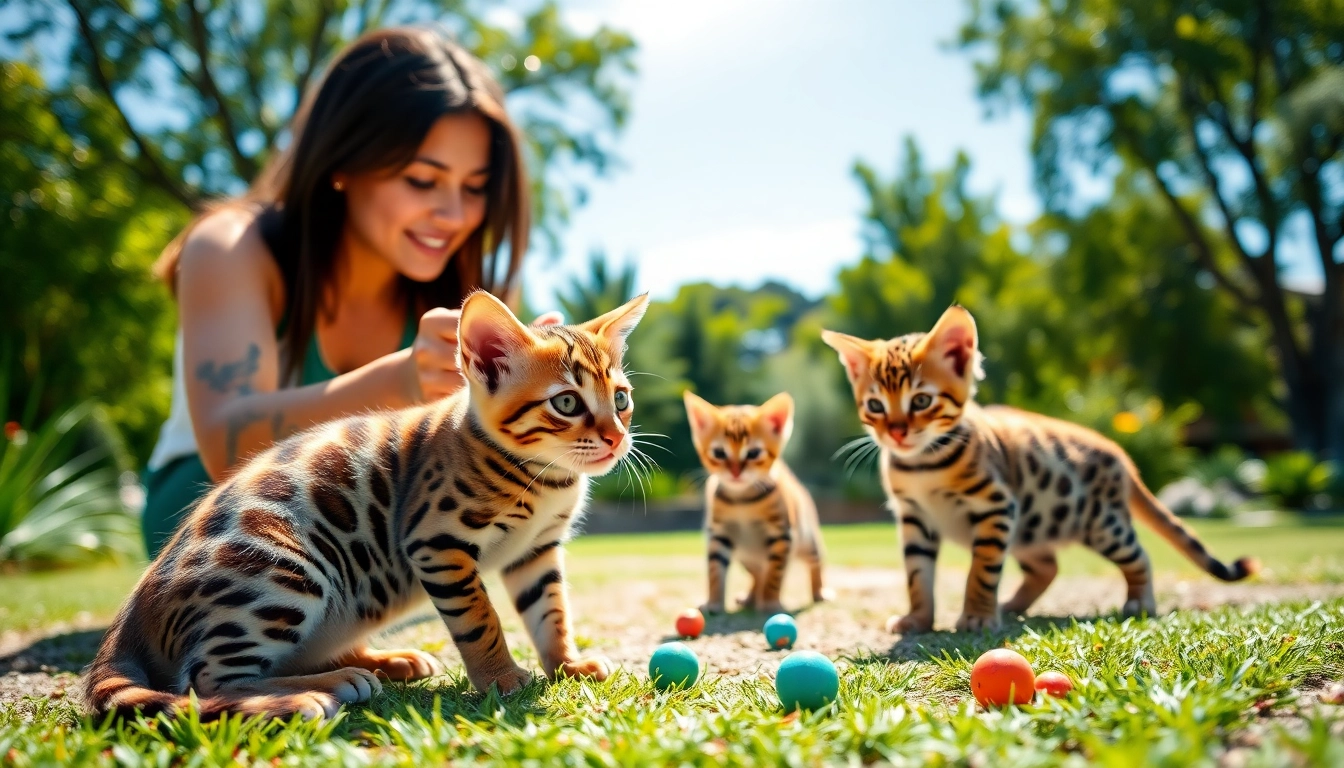
The Appeal of Bengal Cats
Bengal cats are renowned for their striking appearance, vivid personality, and unique lineage. They derive their name from the Asian leopard cat (Prionailurus bengalensis), which contributes to their exotic look characterized by a leopard-like coat. If you’re considering adding a pet to your household, Bengal cats could be an unforgettable choice. Besides their captivating beauty, they offer a rich companionship experience.
Unique Characteristics of Bengals
Bengal cats are easily identifiable by their high-energy demeanor, distinctive coat patterns, and striking colors. Their short, soft fur features a variety of patterns, including rosettes similar to those of some wild cats. This unique fur is not just beautiful; it is also water-resistant, which is believed to be a trait from their wild ancestors.
Another defining characteristic of Bengal cats is their athletic build. Typically, Bengals have a muscular body with a long, lean frame that enables them to jump high and engage in playful activities. This makes them an excellent choice for families or individuals who appreciate an active, engaging pet.
Temperament and Personality
Bengal cats are celebrated not just for their looks but for their lively and engaging personality. They are known to be energetic, playful, and incredibly intelligent. Bengals are often likened to dog-like behavior; they can learn commands, enjoy playing fetch, and might even walk on a leash. Because of their energetic nature, it is essential to provide them with stimulating toys and interactions to prevent boredom.
While Bengals are social and enjoy interaction with their humans, they can also be quite independent. This independence allows them to thrive when left alone for manageable durations, making them suitable for various household settings. However, they do require regular social interaction to remain mentally stimulated and emotionally fulfilled.
Health Considerations for Bengal Kittens
As with any breed, Bengal cats are susceptible to specific health issues. Responsible breeding practices, such as genetic testing and health screenings, are critical in producing healthy kittens. Common concerns in Bengals include hypertrophic cardiomyopathy (HCM), hip dysplasia, and certain skin conditions.
It is crucial for potential Bengal kitten owners to obtain medical records and health status from breeders. Regular veterinary check-ups, vaccinations, and a balanced diet will also play significant roles in ensuring the long-term health of your Bengal cat.
Finding Reputable Bengal Breeders in Orange County
Understanding the importance of sourcing from reputable Bengal breeders is vital for future cat owners. The market can be filled with breeders who prioritize profit over animal welfare, which can lead to heartbreak for future owners. Thus, discernment in choosing breeders in Orange County is essential, and you can start with Bengal Breeders Orange County.
Understanding Registration and Certifications
One essential aspect of finding a respected Bengal breeder is understanding their registration and certifications. In the U.S., the International Cat Association (TICA) is one of the primary registries for Bengals. A responsible breeder should be TICA registered, which indicates adherence to specific breeding guidelines and standards.
Breeders should also provide proof of lineage through pedigree documents. This ensures not only that you are getting a purebred Bengal but also gives insight into the health and temperament history of the kitten. Ask potential breeders for registration details and view the pedigree to ensure that your kitten comes from a reputable background.
Questions to Ask Potential Breeders
When evaluating potential breeders, it is critical to prepare a list of inquiries that will help you assess their practices and the health of their cats. Here are key questions to consider:
- What health tests have been performed on the breeding cats?
- Can I see the living conditions of the kittens and their parents?
- How many litters do you have per year, and what is your breeding philosophy?
- What socialization processes do you implement for your kittens?
- Can you provide references or testimonials from previous buyers?
These questions can help gauge the breeder’s commitment to quality and health, ensuring you find a healthy and well-adjusted Bengal kitten.
Evaluating Breeder Facilities and Practices
When visiting a breeder, take note of the overall environment in which the cats are raised. A reputable breeder should provide a clean, safe space for their kittens with appropriate enrichment activities and socialization. Cats that are kept in small cages or inadequate living conditions may be indicative of poor breeding practices.
Observe how the cats interact with the breeder and visitors. Healthy Bengals should show curiosity, playfulness, and interest in their environment. Breeders should often provide an opportunity to interact with not just the kittens but also their parents, as this can give you an insight into the genetic temperament and social behaviors you can expect.
Preparing for Your New Bengal Kitten
Once you’ve chosen your Bengal kitten, it’s time to prepare your home for their arrival. Setting up a cozy and safe environment will help them adjust smoothly into their new family. Begin by researching and acquiring the necessary supplies to give your Bengal kitten the best start.
Essential Supplies to Have
Before bringing your Bengal home, it’s essential to stock up on necessary supplies to ensure their comfort and well-being:
- High-quality cat food – Bengals require a protein-rich diet.
- Water and food dishes – Opt for ceramic or stainless-steel bowls to avoid chemicals found in plastic.
- Litter box and litter – Make sure to choose a box that is easy for your kitten to enter.
- Scratching posts and toys – These will keep your Bengal entertained and help prevent behavior issues.
- A comfortable bed – Provide a safe and warm spot for your kitten to rest.
Creating a Safe Space for Your Kitten
Establishing a designated space for your new Bengal can significantly alleviate anxiety and help them adjust. This space should be quiet and away from foot traffic. Ensure that the area is kitten-proofed: remove any hazardous items, secure cords, and block off small spaces where they might get stuck.
Understanding Bengal Care and Training Needs
Bengal cats are intelligent and responsive, making them relatively easier to train than other breeds. Consider employing techniques such as positive reinforcement, where you reward desirable behaviors. Training should commence from an early age; teach basic commands and behavioral expectations to set the stage for a well-mannered feline companion.
Incorporate playtime into your daily routine to foster a stronger bond and help keep your Bengal stimulated and physically fit. Engaging in interactive play, such as using feather wands or laser pointers, will not only meet their exercise needs but also provide mental stimulation.
Common Myths About Bengal Cats
As with many exotic breeds, Bengal cats are often the subjects of misconceptions and myths. It’s essential to separate fact from fiction to fully appreciate and care for your Bengal.
Decoding the “Wild” Label
One prevalent myth is that Bengal cats are untamed or have wild temperaments. While they do have a playful, energetic disposition derived from their ancestry, Bengals have been domesticated for many generations. They are affectionate and can be social companions if raised and treated correctly. Understanding this aspect helps potential owners appreciate their unique personality without fearing overly aggressive behavior.
Socialization and Adaptability
Some individuals believe that Bengals are difficult to socialize due to their “wild” reputation. In reality, Bengals thrive on interaction and engagement from their human families. They require adequate socialization from an early age to ensure they grow into well-adjusted adults. Introducing them to different environments, people, and other pets can help them adapt successfully to various situations.
Coat Care and Grooming Tips
Bengals have a short, fine coat that is relatively low maintenance. While they are known to groom themselves effectively, weekly brushing can help remove dead hair and minimize shedding. Baths are rarely necessary, as their fur is naturally water-resistant. However, if your Bengal gets dirty, you can gently use a damp cloth to clean them without stressing them out with a bath.
Building a Relationship with Your Bengal
The bond between you and your Bengal cat can be incredibly rewarding and fulfilling. Building this relationship requires understanding feline behavior and investing time in communication and interaction.
Understanding Bengal Behaviors
Bengal cats exhibit various behaviors that can sometimes be puzzling for new pet owners. They may display interest in water, enjoy climbing high surfaces, and exhibit playful and curious behavior. By understanding these traits, you can better accommodate their needs and provide suitable sources of enrichment.
Socializing Your Kitten
A vital aspect of building a positive relationship with your Bengal is providing opportunities for socialization. Make time for playtime, gentle handling, and exploration of different activities to help your Bengal kitten feel secure in their new environment. Regularly interacting with your kitten will not only increase their trust in you but also enhance their social skills, making for a happier feline.
Long-Term Health and Wellness Strategies
Taking care of your Bengal extends beyond the initial adjustment period. Investing in high-quality food, regular veterinary check-ups, and mental enrichment activities will promote a healthy lifestyle for your feline friend. Maintain a proactive approach to their health by staying informed about breed-specific conditions and changes, and be vigilant for any signs of illness. Home care routines, such as brushing, playtime, and routine check-ups, can contribute significantly to your Bengal’s longevity and happiness.






